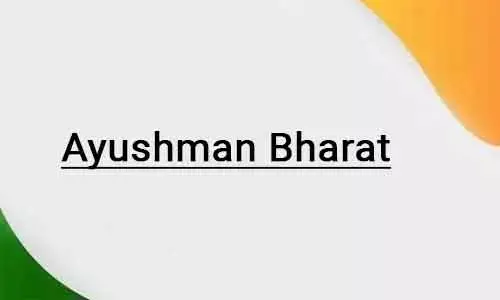- Home
- Medical news & Guidelines
- Anesthesiology
- Cardiology and CTVS
- Critical Care
- Dentistry
- Dermatology
- Diabetes and Endocrinology
- ENT
- Gastroenterology
- Medicine
- Nephrology
- Neurology
- Obstretics-Gynaecology
- Oncology
- Ophthalmology
- Orthopaedics
- Pediatrics-Neonatology
- Psychiatry
- Pulmonology
- Radiology
- Surgery
- Urology
- Laboratory Medicine
- Diet
- Nursing
- Paramedical
- Physiotherapy
- Health news
- Fact Check
- Bone Health Fact Check
- Brain Health Fact Check
- Cancer Related Fact Check
- Child Care Fact Check
- Dental and oral health fact check
- Diabetes and metabolic health fact check
- Diet and Nutrition Fact Check
- Eye and ENT Care Fact Check
- Fitness fact check
- Gut health fact check
- Heart health fact check
- Kidney health fact check
- Medical education fact check
- Men's health fact check
- Respiratory fact check
- Skin and hair care fact check
- Vaccine and Immunization fact check
- Women's health fact check
- AYUSH
- State News
- Andaman and Nicobar Islands
- Andhra Pradesh
- Arunachal Pradesh
- Assam
- Bihar
- Chandigarh
- Chattisgarh
- Dadra and Nagar Haveli
- Daman and Diu
- Delhi
- Goa
- Gujarat
- Haryana
- Himachal Pradesh
- Jammu & Kashmir
- Jharkhand
- Karnataka
- Kerala
- Ladakh
- Lakshadweep
- Madhya Pradesh
- Maharashtra
- Manipur
- Meghalaya
- Mizoram
- Nagaland
- Odisha
- Puducherry
- Punjab
- Rajasthan
- Sikkim
- Tamil Nadu
- Telangana
- Tripura
- Uttar Pradesh
- Uttrakhand
- West Bengal
- Medical Education
- Industry
Kerala: Public hospitals facing financial crisis over non payment of claims under KASP scheme

Thiruvananthapuram: The government's flagship health assurance scheme in Kerala, Ayushman Bharat-Karunya Aarogya Suraksha Padhati (AB-KASP), has now put the secondary and tertiary care public sector hospitals of the state in a financial quandary as the latter are unable to settle bills due to the overdue claims and non-payment of settled claims amount by the government.
The basic principle of KASP is that the government would provide a good amount of its expenditure to the public hospitals as claims, which would then use for improving service delivery or strengthening infrastructure in the hospitals.
Also Read:NHA to grade Ayushman Bharat PM-JAY hospitals on value based care
Over the past three years, the pending insurance claim payment has amounted to a huge amount which has now begun to affect the new health insurance scheme that the Government has launched for public servants and pensioners called MEDISEP.
An administrator of a medical college hospital said, "We cannot deny a patient who comes to the hospital seeking free care under KASP. But we are under tremendous stress to ensure that mounting KASP bills are now affecting other schemes like MEDISEP because our purchase channels — drugs, consumables, cardiac stents, surgical implants, etc — for both schemes are the same. Our empanelled suppliers have been threatening to stop supplies because we are unable to pay their bills running into crores. Without sufficient funds, we are headed for a meltdown."
The AB-KASP was turned into an assurance mode by the Kerala government in April 2020 through a government order when delays in claims settlement and high claims rejection rate by the insurance companies crept up. The State Health Agency (SHA) was then given the responsibility to operationalise AB-KASP in the assurance mode, in which the government would be directly involved in settling the claims.
The GO focused on, "auto approval of pre-authorisations from public hospitals," and the insurance agencies were taken away from the picture. However, the assurance mode seems to have increased the financial stress on the public hospitals in the state.
Speaking to the Hindu, a public health expert pointed out, "Kerala’s own health financing schemes (RSBY/CHIS/CHIS-Plus and KBF) were providing most specialty and superspecialty packages, and that too at a lower resource envelope, well before the implementation of AB-KASP in 2019. The beneficiary count remains the same at 41.2 lakh families. Former Finance Minister, Thomas Isaac, had at the time pointed out that AB was going to be a drain on States because, given the low Central share, States would end up paying a premium of ₹5,000-₹7,000 per head. Yet, the State chose to launch KASP in alignment with AB."
He said that even though AB-KASP has been able to provide free treatment to lakhs of poor people in the state, the government cannot sustain a health financing scheme without any financial discipline or cost control mechanism.
The D. Narayana Committee was set up in 2018 with the aim to study the implementation of KASP in alignment with AB in Kerala. It had recommended the setting up of "a robust accounting mechanism to track pending payments to public hospitals" and an "effective utilization of these funds for improving service delivery in hospitals."
Revu is currently pursuing her masters from University of Hyderabad. With a background in journalism, she joined Medical Dialogues in 2021.


